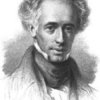George Combe

George Combe
George Combewas the leader of – and the spokesman for – the phrenological movement for more than twenty years. He founded the Edinburgh Phrenological Society in 1820 and was the author of the highly influential The Constitution of Man. Combe trained in Scots law and had an Edinburgh solicitor's practice. In his later years, after a successful marriage in 1833, Combe devoted himself to international travel in the promotion of phrenology...
NationalityAmerican
ProfessionEducator
Date of Birth21 October 1788
CountryUnited States of America
And if these be unprincipled agents who scruple at nothing, he will be a bold man who will deny that there are always to be found men at the bar who lend their services most cordially to back and support these agents in their most desperate cases.
The interval allowed was only five minutes, at the end of which I resumed the lecture; but so refreshing was the effects of the brief rest and, above all, the admission of pure air, that during the second hour the attention was as completely sustained as during the first.
We used to speak familiarly of an agent, now do more, who was accustomed to manufacture evidence, and to invent facts in his cases, or at least to alter the aspects of facts to such an extent that they might fairly be viewed as new.
The same practice was continued every evening through the whole course, and with the same success. Many individuals expressed their gratification at having discovered such simple means of relieving the tedium of a long discourse.
I called their attention also to the absence of all means of ventilating the hall, remarking that, as we had already breathed the air which it contained for a full hour, it must have lost much of its vital properties and needed to be renewed.
He has a number of curious facts in illustration of the power of mere goodness to protect against outrage.
They are few in the midst of an overwhelming mass of brute force, and their submission is wisdom; but for a nation like England to submit to be robbed by any invader who chooses to visit her shores seemed to me to be nonsense.
In Scotland, writers to the signet, whose chief occupation lies in conducting litigations, are men whose natural qualities fit them for this duty.
It used to be said of this man that he would gain any case that was in itself debateable, and depended on evidence, if he got money enough.
This class of writers comes most into contact with the barristers, because almost the exclusive occupation of the latter is to conduct litigation.
While some animals exhibit individual powers in higher perfection, man stands for their superior, not only in combining in his own body all the senses and faculties which they possess, but in being endowed with moral and intellectual powers which are denied to them, and which at once place him at the head of the living creation, and constitute him a moral, religious, intelligent, and responsible being.
A tendency to resume the same mode of action at stated times is peculiarly the characteristic of the nervous system; and on this account regularity is of great consequence in exercising the moral and intellectual power. All nervous diseases have a marked tendency to observe regular periods; and the natural inclination to sleep at the approach of night is another instance of the same fact.
Individuals possessing moderate-sized brains easily find their proper sphere, and enjoy in it scope for all their energy. In ordinary circumstances they distinguish themselves, but they sink when difficulties accumulate around them. Persons with large brains, on the other hand, do not readily attain their appropriate place; common occurrences do not rouse or call them forth.
Fashion is not a real element of beauty in external objects; and to persons who possess a good endowment of Form, Constructiveness and Ideality, intrinsic elegance is much more pleasing and permanently agreeable, than forms of less merit, recommended merely by being new. Hence there is a beauty which never palls, and there are objects over which fashion exercises no control.